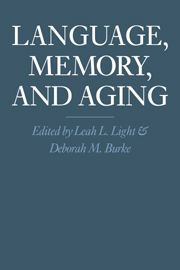Book contents
- Frontmatter
- Contents
- List of contributors
- Preface
- 1 Theories of information processing and theories of aging
- 2 Effects of aging on verbal abilities: Examination of the psychometric literature
- 3 Aging and individual differences in memory for written discourse
- 4 Geriatric psycholinguistics: Syntactic limitations of oral and written language
- 5 Aging and memory activation: The priming of semantic and episodic memories
- 6 Automatic and effortful semantic processes in old age: Experimental and naturalistic approaches
- 7 Integrating information from discourse: Do older adults show deficits?
- 8 Comprehension of pragmatic implications in young and older adults
- 9 Capacity theory and the processing of inferences
- 10 Age differences in memory for texts: Production deficiency or processing limitations?
- 11 Episodic memory and knowledge interactions across adulthood
- 12 The disorder of naming in Alzheimer's disease
- 13 Language and memory processing in senile dementia Alzheimer's type
- 14 Patterns of language and memory in old age
- Author index
- Subject index
4 - Geriatric psycholinguistics: Syntactic limitations of oral and written language
Published online by Cambridge University Press: 05 January 2012
- Frontmatter
- Contents
- List of contributors
- Preface
- 1 Theories of information processing and theories of aging
- 2 Effects of aging on verbal abilities: Examination of the psychometric literature
- 3 Aging and individual differences in memory for written discourse
- 4 Geriatric psycholinguistics: Syntactic limitations of oral and written language
- 5 Aging and memory activation: The priming of semantic and episodic memories
- 6 Automatic and effortful semantic processes in old age: Experimental and naturalistic approaches
- 7 Integrating information from discourse: Do older adults show deficits?
- 8 Comprehension of pragmatic implications in young and older adults
- 9 Capacity theory and the processing of inferences
- 10 Age differences in memory for texts: Production deficiency or processing limitations?
- 11 Episodic memory and knowledge interactions across adulthood
- 12 The disorder of naming in Alzheimer's disease
- 13 Language and memory processing in senile dementia Alzheimer's type
- 14 Patterns of language and memory in old age
- Author index
- Subject index
Summary
Geriatric psycholinguistics has largely neglected to examine the basic psycholinguistic abilities of adults. Although rarely made explicit, traditional models of language acquisition assume that linguistic skills, once acquired, do not vary across the lifespan (cf. Clark & Clark, 1977; Menyuk, 1977; Owens, 1984; Slobin, 1981). Obler (1985) has emphasized the expansion of vocabulary and acquisition of pragmatic skills as central characteristics of adult language development. The expanded pragmatic skills of adults include the acquisition of multiple speech registers or stylistic shifts in phonology and syntax reflecting differences in audience, context, or topic. Nevertheless, age-related declines in basic linguistic skills have been found in normative studies of the many standardized tests of adult language (Albert, 1981; Borod, Goodglass, & Kaplan, 1980; Duffy, Keith, Shane, & Podraza, 1976; Emery, this volume; Gleason et al., 1980; Schuell, 1965). These norms indicate that linguistic skills deteriorate in old age in otherwise healthy and active adults.
Obler and her colleagues (1980, 1985; Obler & Albert, 1985; Gleason et al., 1980) reported that young and elderly adults responded differently when asked to tell a story about a picture; she concluded that elderly adults are more loquacious than middle-aged adults and that elderly adults' speech is more “elaborate” in that their speech is characterized by more repetition and redundancy, metalinguistic comments, and personalizations.
Other studies by Walker, Hardiman, Hedrick, and Holbrook (1981) and Emery (1985, 1986, this volume) support the conclusion that elderly adults' language skills are impaired relative to those of young adults.
Information
- Type
- Chapter
- Information
- Language, Memory, and Aging , pp. 58 - 76Publisher: Cambridge University PressPrint publication year: 1988
Accessibility standard: Unknown
- 32
- Cited by
